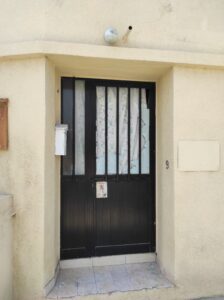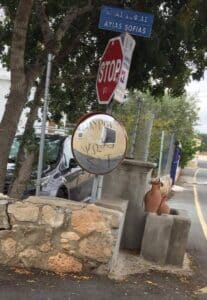Cyprus Mail 30 August 2023 - by Iole Damaskinos

Local residents assess the damage to a Syrian restaurant in the village
After two nights of violence, Iole Damaskinos goes to Chlorakas and speaks to those living in the village
Fear, smouldering frustration and disbelief were the key feelings among Chlorakas residents, shopkeepers and migrants on Tuesday in the aftermath of violence between locals and Syrians that saw riot police chasing perpetrators through the village streets late into Monday night.
In the Ayios Nikolaos complex, once a holiday resort, where tensions began last week, all seemed oddly quiet, and despite reports that the area would be guarded and heavily patrolled round-the-clock, no sign of police was evident at 11am. Most of the migrant residents have moved on.
Piles of debris of all sorts, a used barbecue, and children’s toys, lying beside a dilapidated playground and a crumbling building with still-perfect lettering reading Administration Office Reception, added to the surrealist feel.
The eerie stillness, punctuated by cicadas and rubbish being blown about, was broken only by the occasional sound of a creak or closing door, while many apartments showed clear evidence of hasty abandonment.

A well-groomed young man named Sesar, walking through the near-apocalyptic scene wearing a smile and earphones, told the Cyprus Mail he is 20 and lives in the complex. He arrived on the island three years ago from Syria. Limited understanding of English and Greek made further communication difficult.
Another resident from Nigeria called down from a balcony in greeting.
“The situation is very bad here,” he said, “I don’t know where to go, I am getting ready to go and sleep on the beach.”
Asked whether he had not been offered the option to move to the centre in Kofinou he said, “No, no one told me anything about this.”
He wouldn’t comment further: “I am afraid you know, the situation is really crazy.”
Forty-year-old Muhammad beckoned for us to enter the building. “If you want to see what the Cypriot state did to people I will show you,” he said using Google’s translate function.
“Here one family lived, Nigerian with children,” he said, pointing to clothing and a child’s stuffed toy. The scene overall, as well as that of other apartments, suggested a chaotic move, with inhabitants leaving behind clothing, toys, children’s backpacks, even a bicycle.
According to Muhammed 30 to 40 children, from infants to ten-year-olds, lived in the complex before the evictions. A political source later said that none of the children attended school “because the mukhtar refused to give them proof of residence, saying that they would be [imminently] moved.”
“They took lots of people to Kofinou but they are lying about everything,” Muhammed said. “I went there myself and saw that it was rubbish. All the people who were taken there have left that place,” he claimed. “We are humans not animals,” he added in apparent reference to the remote location and sparse conditions at the centre.
Mohammed, who works as a builder, said he travelled by plane from Lebanon to “Turkish Cyprus” and then crossed over “through the UN” five years ago. He said it took over three years to get his refugee status.
Ali, his friend, who lives in Kissonerga, phones. “I have taken in three families, they are living with me. They don’t want to go to Kofinou because of the conditions there, and they are scared to go anywhere else right now, the children are scared, they saw things… so we are trying to help them,” he said.
Across the street from the complex, a grandmother of Eastern European origin, who asked to remain anonymous, opened her door to receive an Indian Wolt delivery driver.
“I never had trouble with any of the migrants,” she said, “and I just feel so sad for the children. They used to come and play here. We need to be humane. It’s awful… the children were crying when they had to leave. I understand their difficulties.”
Out on the main street, shopkeepers expressed caution and disparagement.
“They are all to blame,” one café owner said. “Ours [Greek Cypriots] and them [the migrants]. It wasn’t right for them to threaten to ‘turn Paphos upside down’… I mean you are a visitor here, this was too much. But the others, it’s not right what they did, smashing people’s homes!”
She pointed to a house whose door window had been smashed, where a Syrian family used to live, who she said had moved elsewhere to lay low for a while.

“I don’t want to get involved. I just want to keep my head down and protect my shop. I am afraid, yes, of what insanity either group might do.”
She said that on Monday afternoon police advised all the shops on the main streets to close at 3pm, expecting trouble.
“They can call me racist, I don’t care,” another business owner, clearly exasperated, said. “We have had enough. We are a small village, 8,000-9,000 people and we have been forced to take in thousands of migrants in the space of a few years. Why should we?” he asked.
“The government has no policy, neither the previous one, nor the one now. They made huge mistakes, but why should I as a taxpayer, or the village, have to suffer for that?”
He said UK residents are selling up and leaving, while his 16-year-old daughter is afraid to walk the streets at night.
Just behind the complex, Ahmed, the owner of a Syrian café that was smashed up on Sunday night, treaded gingerly out to its patio over scattered shards of glass.
“Are you going to show my face?” he asked in worried tones in Greek. “I bought this place a year and a half ago. The mukhtar has been after me, wanting to close me down ever since I opened.”
Outside, a group of young men, apparently there to aid with the clean-up, is gathered. They are in grave discussion among themselves in Arabic.
“I don’t want to stay in Cyprus,” Ahmed, a family man with five children, who is under subsidiary protected status, declared. His status allows residency and employment and must be renewed annually – but only for as long as war conditions prevail in his country of origin.
“People want us to leave, I also want to leave. But I can’t get a passport,” Ahmed explains. “If you want us to leave, give us the means to leave,” he says.